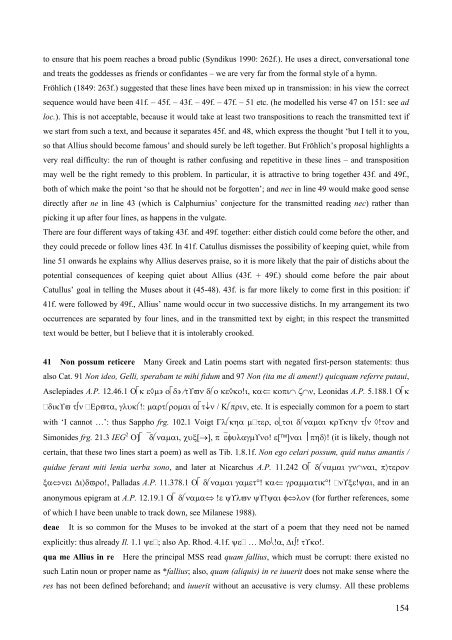CATULLUS 68 - Scuola Normale Superiore
CATULLUS 68 - Scuola Normale Superiore
CATULLUS 68 - Scuola Normale Superiore
You also want an ePaper? Increase the reach of your titles
YUMPU automatically turns print PDFs into web optimized ePapers that Google loves.
to ensure that his poem reaches a broad public (Syndikus 1990: 262f.). He uses a direct, conversational tone<br />
and treats the goddesses as friends or confidantes – we are very far from the formal style of a hymn.<br />
Fröhlich (1849: 263f.) suggested that these lines have been mixed up in transmission: in his view the correct<br />
sequence would have been 41f. – 45f. – 43f. – 49f. – 47f. – 51 etc. (he modelled his verse 47 on 151: see ad<br />
loc.). This is not acceptable, because it would take at least two transpositions to reach the transmitted text if<br />
we start from such a text, and because it separates 45f. and 48, which express the thought ‘but I tell it to you,<br />
so that Allius should become famous’ and should surely be left together. But Fröhlich’s proposal highlights a<br />
very real difficulty: the run of thought is rather confusing and repetitive in these lines – and transposition<br />
may well be the right remedy to this problem. In particular, it is attractive to bring together 43f. and 49f.,<br />
both of which make the point ‘so that he should not be forgotten’; and nec in line 49 would make good sense<br />
directly after ne in line 43 (which is Calphurnius’ conjecture for the transmitted reading nec) rather than<br />
picking it up after four lines, as happens in the vulgate.<br />
There are four different ways of taking 43f. and 49f. together: either distich could come before the other, and<br />
they could precede or follow lines 43f. In 41f. Catullus dismisses the possibility of keeping quiet, while from<br />
line 51 onwards he explains why Allius deserves praise, so it is more likely that the pair of distichs about the<br />
potential consequences of keeping quiet about Allius (43f. + 49f.) should come before the pair about<br />
Catullus’ goal in telling the Muses about it (45-48). 43f. is far more likely to come first in this position: if<br />
41f. were followed by 49f., Allius’ name would occur in two successive distichs. In my arrangement its two<br />
occurrences are separated by four lines, and in the transmitted text by eight; in this respect the transmitted<br />
text would be better, but I believe that it is intolerably crooked.<br />
41 Non possum reticere Many Greek and Latin poems start with negated first-person statements: thus<br />
also Cat. 91 Non ideo, Gelli, sperabam te mihi fidum and 97 Non (ita me di ament!) quicquam referre putaui,<br />
Asclepiades A.P. 12.46.1 Ο⎡κ ε◊μ∋ ο⎡δ∋ ⁄τϒϖν δ⎛ο κε◊κο!ι, κα⇐ κοπι∩ ζ∩ν, Leonidas A.P. 5.188.1 Ο⎡κ<br />
δικϒϖ τ∫ν Ερϖτα, γλυκ⎛!: μαρτ⎛ρομαι α⎡τ↓ν / Κ⎛πριν, etc. It is especially common for a poem to start<br />
with ‘I cannot …’: thus Sappho frg. 102.1 Voigt Γλ⎛κηα μ τερ, ο⎣τοι δ⎛ναμαι κρϒκην τ∫ν ◊!τον and<br />
Simonides frg. 21.3 IEG 2 Ο]⎡⎯ δ⎛ναμαι, χυξ[→], π⎯εφυλαγμϒνο! ε[]ναι ⎮πηδ〉! (it is likely, though not<br />
certain, that these two lines start a poem) as well as Tib. 1.8.1f. Non ego celari possum, quid nutus amantis /<br />
quidue ferant miti lenia uerba sono, and later at Nicarchus A.P. 11.242 Ο⎡ δ⎛ναμαι γν∩ναι, π〉τερον<br />
ξα⇔νει Δι〉δϖρο!, Palladas A.P. 11.378.1 Ο⎡ δ⎛ναμαι γαμετ°! κα⇐ γραμματικ°! νϒξε!ψαι, and in an<br />
anonymous epigram at A.P. 12.19.1 Ο⎡ δ⎛ναμα⇔ !ε ψϒλϖν ψϒ!ψαι φ⇔λον (for further references, some<br />
of which I have been unable to track down, see Milanese 1988).<br />
deae It is so common for the Muses to be invoked at the start of a poem that they need not be named<br />
explicitly: thus already Il. 1.1 ψε ; also Ap. Rhod. 4.1f. ψε … Μο⎝!α, Δι∫! τϒκο!.<br />
qua me Allius in re Here the principal MSS read quam fallius, which must be corrupt: there existed no<br />
such Latin noun or proper name as *fallius; also, quam (aliquis) in re iuuerit does not make sense where the<br />
res has not been defined beforehand; and iuuerit without an accusative is very clumsy. All these problems<br />
154






